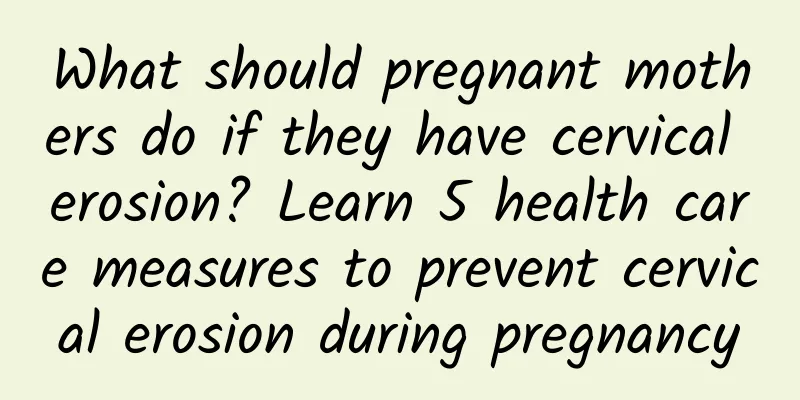What anti-inflammatory drugs should be taken after curettage for endometrial thickening? These drugs are essential

|
What kind of anti-inflammatory drugs should be taken after curettage for endometrial thickening? Curettage is a minor gynecological surgery, which is mainly used to scrape the endometrium or the contents of the uterine cavity. It is also one of the main methods of artificial abortion and incomplete medical abortion. So what kind of anti-inflammatory drugs should be taken after curettage? How to use anti-inflammatory drugs after curettage mainly depends on different conditions. Uterine curettage is the second most common gynecologic procedure. The main indications for uterine curettage are diagnosis and treatment: Polymenorrhea: less than 21 days between menstrual periods. More than 37 days between menstrual periods. Menorrhagia: heavy or prolonged menstrual bleeding. Postmenopausal bleeding: uterine bleeding that occurs more than 12 months after menopause. Breakthrough bleeding: recurrent bleeding during the menstrual cycle, which is a result of exogenous hormones. Dysfunctional uterine bleeding: any abnormal uterine bleeding that occurs in the absence of pregnancy, tumor, infection, or uterine damage. Others: spontaneous abortion, incomplete abortion, inevitable abortion, intrauterine fetal death, pyogenic abortion, termination of pregnancy, dilation and expulsion of gestational trophoblastic tumor. The procedure involves dilation of the cervix and removal of the uterine contents and endometrial tissue. The patient is placed on a table in a position for stone removal. The perineum and vagina are cleansed with povidone-iodine (Betadine) solution. A straight Jacobs (two-tooth) forceps or a single-tooth retinaculum is used to grasp and stabilize the cervix. A bilateral examination is performed to determine the size and position of the uterus, and the length of the uterine cavity and the angle between the cervical canal and the uterine cavity are carefully determined by uterine sonography. Sounding the uterus is contraindicated in the setting of pregnancy as this increases the risk of penetrating a soft uterus. A dilator is then passed through the cervix to achieve the desired cervical canal diameter. After dilation, a ureterolithiasis forceps can be placed into the uterine cavity and endometrial polyps removed. Curettage is performed with a small serrated curette that can be used to systematically scrape the uterine cavity until the uterus "cries" (vibrations felt when the scraper is gently dragged across the denuded endometrium). When scraping placental tissue, a large, blunt, smooth curette is used to reduce the possibility of perforation and endometrial induration. Generally speaking, curettage is very harmful to the body. Nowadays, many young girls do not pay attention to these problems. They go for curettage after something happens, and do not pay attention to maintenance afterwards. This is very harmful to the body. Multiple curettage may cause irreparable damage to reproductive function. You should also be cautious in taking medication after surgery, and you should pay attention to using anti-inflammatory drugs under the guidance and cooperation of doctors. There are many anti-inflammatory drugs that can be taken after an abortion. If there is no history of drug allergy, you can consider taking cephalosporin antibiotics plus metronidazole or tinidazole. For specific usage, refer to the instructions or follow the doctor's advice. The anti-inflammatory drugs taken after an abortion are generally written on the prescription by the doctor. The postoperative anti-inflammatory drugs prescribed by the doctor for the abortion recipient are generally metronidazole, sparfloxacin, cephalosporins and other drugs. If the patient does not get good results from taking anti-inflammatory drugs after an abortion, you can also get an anti-inflammatory injection to prevent infection of the reproductive organs. In general, the following points should be noted after curettage: 1. Abdominal pain may occur due to uterine contraction after surgery, which will usually be relieved in half an hour to an hour. If severe abdominal pain, vaginal bleeding with a lot of blood clots, and high fever occur several hours or days later, please go to the hospital for treatment. 2. Due to the trauma left on the endometrium after curettage, there will be vaginal bleeding within two weeks after the operation. Generally, the amount of blood is less than the menstrual volume or similar to the menstrual volume, which is normal. If the bleeding has not stopped for more than two weeks or the amount of blood exceeds the menstrual volume, please go to the hospital immediately. 3. After the curettage, you need to rest in the hospital for half an hour to one hour. You can leave the hospital only if you do not feel any special discomfort. 4. Due to the pain stimulation during the operation, you may sweat a lot. Therefore, you should pay attention to keeping warm, avoid wind and cold, and avoid using air conditioning too much in the midsummer. 5. Keep the perineum clean and dry, and change sanitary napkins frequently. Do not wash the vagina with your hands, and do not use any medicated lotion to wash the vagina yourself. |
<<: Abnormal vaginal discharge? How to judge from the "color" and "quality"
>>: How much does cervical cancer surgery cost? Is this surgery cost reasonable?
Recommend
Where can I get massage to treat irregular menstruation?
Menstrual disorders are also called irregular men...
What are the symptoms of bacterial vaginosis?
What are the symptoms of bacterial vaginitis? As ...
Delicious mushrooms can lower cholesterol and help you lose weight and keep you in shape
As fall approaches, mushrooms will soon be availa...
Ultrasound examination is the main method for diagnosing uterine fibroids.
The diagnosis of uterine fibroids mainly relies o...
How to eat to lose weight and exercise? 4 essential nutrients
[Key Points]: Many people say that their fitness ...
How to prevent amenorrhea in women
How to prevent female amenorrhea? Some women don&...
What are the types of dysmenorrhea? Here is the answer
Dysmenorrhea is divided into primary dysmenorrhea...
How to differentiate and diagnose left ovarian cyst and what are its symptoms
Ovarian cyst is a relatively complicated disease ...
Are you also a fat "belly dad"? I'm afraid it's "this" that's causing the trouble! Medical Explanation: 4 Signs of Male Hormone Imbalance
Are you also a fat "belly dad"? Be care...
What are the preventive measures for chronic cervicitis?
Chronic cervicitis is one of the common genital t...
There are 6 things to pay attention to during perimenopause pregnancy. You should pay attention to them for yourself and your baby.
It can be said that the chances of perimenopausal...
Pumpkin has antioxidant properties and helps improve metabolic syndrome! Nutritionist Xie Yifang reveals: 4 benefits of nutritious light meals
More than half of the top ten causes of death in ...
4 symptoms of uterine fibroids
Uterine fibroids are the most common benign tumor...
Is it easy to treat anemia caused by uterine fibroids?
Anemia caused by uterine fibroids can be improved...
Surgical treatment of hyperprolactinemia
If you suffer from hyperprolactinemia during preg...









